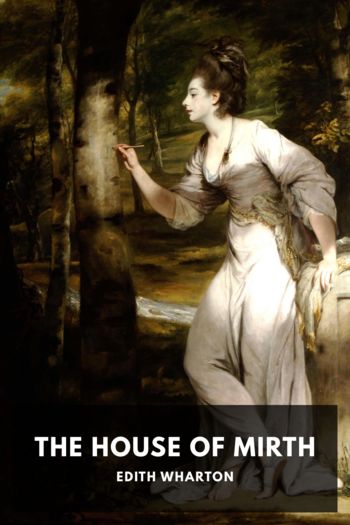The Age of Innocence by Edith Wharton (android based ebook reader .txt) 📕

- Author: Edith Wharton
Book online «The Age of Innocence by Edith Wharton (android based ebook reader .txt) 📕». Author Edith Wharton
Now he saw the matter in a new light, and his part in it seemed singularly diminished. It was, in fact, that which, with a secret fatuity, he had watched Mrs. Thorley Rushworth play toward a fond and unperceiving husband: a smiling, bantering, humouring, watchful and incessant lie. A lie by day, a lie by night, a lie in every touch and every look; a lie in every caress and every quarrel; a lie in every word and in every silence.
It was easier, and less dastardly on the whole, for a wife to play such a part toward her husband. A woman’s standard of truthfulness was tacitly held to be lower: she was the subject creature, and versed in the arts of the enslaved. Then she could always plead moods and nerves, and the right not to be held too strictly to account; and even in the most straitlaced societies the laugh was always against the husband.
But in Archer’s little world no one laughed at a wife deceived, and a certain measure of contempt was attached to men who continued their philandering after marriage. In the rotation of crops there was a recognised season for wild oats; but they were not to be sown more than once.
Archer had always shared this view: in his heart he thought Lefferts despicable. But to love Ellen Olenska was not to become a man like Lefferts: for the first time Archer found himself face to face with the dread argument of the individual case. Ellen Olenska was like no other woman, he was like no other man: their situation, therefore, resembled no one else’s, and they were answerable to no tribunal but that of their own judgment.
Yes, but in ten minutes more he would be mounting his own doorstep; and there were May, and habit, and honour, and all the old decencies that he and his people had always believed in …
At his corner he hesitated, and then walked on down Fifth Avenue.
Ahead of him, in the winter night, loomed a big unlit house. As he drew near he thought how often he had seen it blazing with lights, its steps awninged and carpeted, and carriages waiting in double line to draw up at the curbstone. It was in the conservatory that stretched its dead-black bulk down the side street that he had taken his first kiss from May; it was under the myriad candles of the ballroom that he had seen her appear, tall and silver-shining as a young Diana.
Now the house was as dark as the grave, except for a faint flare of gas in the basement, and a light in one upstairs room where the blind had not been lowered. As Archer reached the corner he saw that the carriage standing at the door was Mrs. Manson Mingott’s. What an opportunity for Sillerton Jackson, if he should chance to pass! Archer had been greatly moved by old Catherine’s account of Madame Olenska’s attitude toward Mrs. Beaufort; it made the righteous reprobation of New York seem like a passing by on the other side. But he knew well enough what construction the clubs and drawing-rooms would put on Ellen Olenska’s visits to her cousin.
He paused and looked up at the lighted window. No doubt the two women were sitting together in that room: Beaufort had probably sought consolation elsewhere. There were even rumours that he had left New York with Fanny Ring; but Mrs. Beaufort’s attitude made the report seem improbable.
Archer had the nocturnal perspective of Fifth Avenue almost to himself. At that hour most people were indoors, dressing for dinner; and he was secretly glad that Ellen’s exit was likely to be unobserved. As the thought passed through his mind the door opened, and she came out. Behind her was a faint light, such as might have been carried down the stairs to show her the way. She turned to say a word to someone; then the door closed, and she came down the steps.
“Ellen,” he said in a low voice, as she reached the pavement.
She stopped with a slight start, and just then he saw two young men of fashionable cut approaching. There was a familiar air about their overcoats and the way their smart silk mufflers were folded over their white ties; and he wondered how youths of their quality happened to be dining out so early. Then he remembered that the Reggie Chiverses, whose house was a few doors above, were taking a large party that evening to see Adelaide Neilson in Romeo and Juliet, and guessed that the two were of the number. They passed under a lamp, and he recognised Lawrence Lefferts and a young Chivers.
A mean desire not to have Madame Olenska seen at the Beauforts’ door vanished as he felt the penetrating warmth of her hand.
“I shall see you now—we shall be together,” he broke out, hardly knowing what he said.
“Ah,” she answered, “Granny has told you?”
While he watched her he was aware that Lefferts and Chivers, on reaching the farther side of the street corner, had discreetly struck away across Fifth Avenue. It was the kind of masculine solidarity that he himself often practised; now he sickened at their connivance. Did she really imagine that he and she could live like this? And if not, what else





Comments (0)